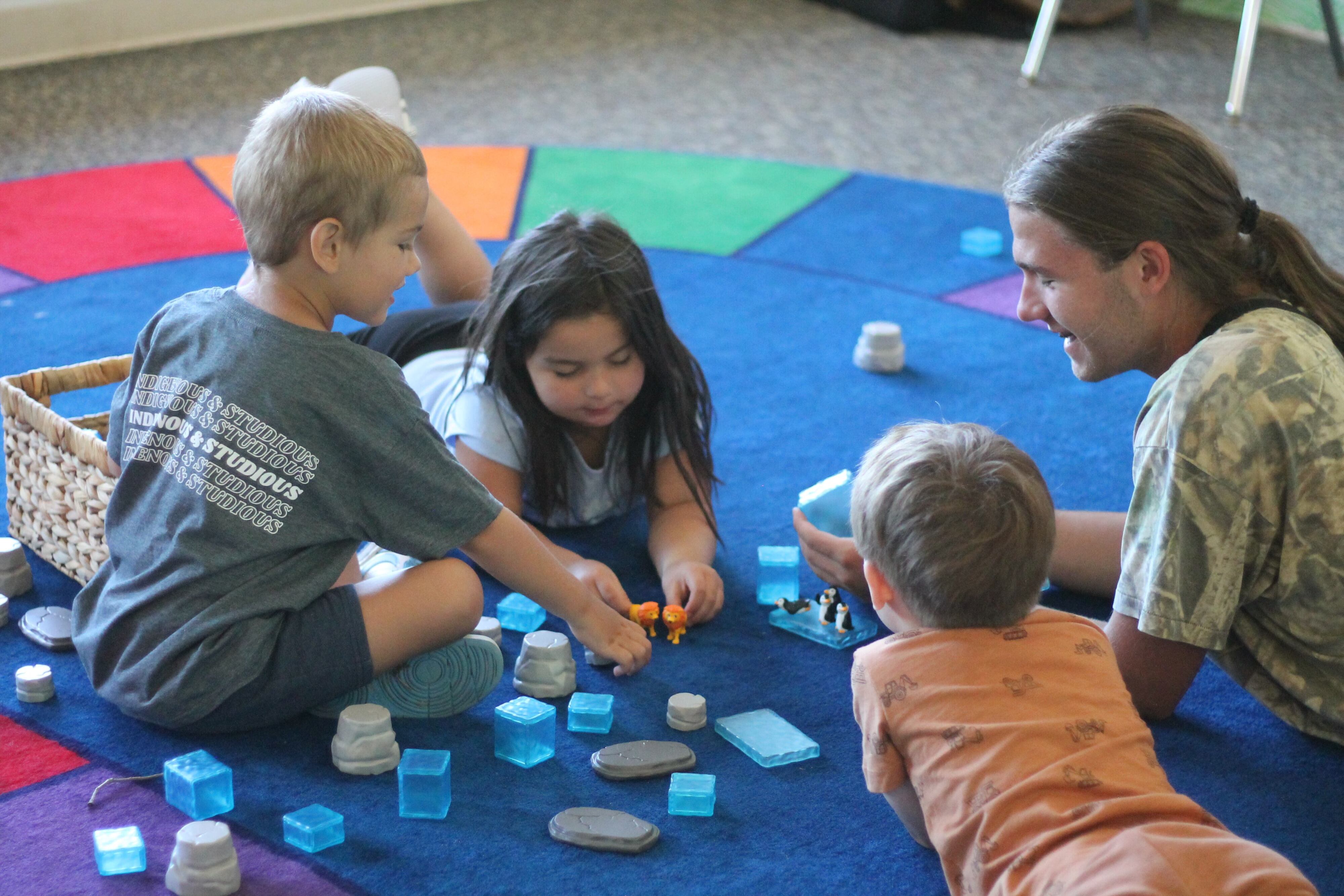
Preschoolers Learn in Chinuk Wawa at Tribal School
Eleven preschoolers are spread out across a classroom at Shawash-iliʔi Skul, an immersion school operated by the Confederated Tribes of Grand Ronde in northwestern Oregon, chatting away in a mix of English and Chinuk Wawa, a historical language of the tribe. For these children, speaking Chinuk Wawa is natural, but for tribal members, it represents a significant cultural milestone. The presence of the language in early education reflects a broader effort to preserve and pass on traditions, languages, and values.
The teachers, whom the children affectionately call “auntie” and “uncle,” move around the room, helping with tasks like sharpening pencils or joining in games. Creating such programs has not been without challenges. Efforts to establish a dedicated Tribal Early Learning Hub over two years were met with obstacles in 2023, despite $2 million in state and federal funding. Concerns about tribal sovereignty among the nine tribes in Oregon led to setbacks. However, advocates regrouped and successfully pushed for a bill that creates a dedicated fund allowing each tribe to design its own early education approach.
A Step Forward for Tribal Education
Angela Fasana, Grand Ronde’s education manager, sees this as a crucial step forward. However, she acknowledges that more work is needed. The path to establishing the new fund was not smooth. For years, tribal leaders have faced barriers in passing along their cultures, languages, and traditions through early education. Oregon’s financial support for early childhood education is distributed through 16 geographic hubs, but accessing funds was a major hurdle for some tribes.
Fasana noted that while one hub was welcoming and shared resources, other tribal partners in different parts of the state did not have the same experience. In 2021, lawmakers tried to address this by creating a dedicated Tribal Early Learning Hub, but it proved insufficient. Valerie Switzler, education manager for the Confederated Tribes of Warm Springs, explained that tribes could not access the money directly and had to go through third parties. This process was further complicated by staff turnover in the Department of Early Learning and Care’s tribal affairs positions.
The New Tribal Early Learning Fund
The new Tribal Early Learning Fund emerged from discussions among tribal leaders and was passed with bipartisan support in June. Paulina Whitehat, the state early learning department’s tribal affairs director, emphasized that the fund recognizes the importance of tribes designing early learning systems rooted in their language, culture, and values. However, the initial budget proposed by Gov. Tina Kotek included $4.75 million, which lawmakers reduced to approximately $700,000 for the 2025–2027 biennium. This amount, roughly $73,880 per tribe, is enough to maintain current services but not to expand them.
Councilor Julie Siestreem of the Confederated Tribes of Coos, Lower Umpqua and Siuslaw expressed relief that they are not losing ground. Currently, her tribe does not have a dedicated space for early childhood education, and if they had more funding, they would likely use it to build a separate facility for the education department. Fasana mentioned that the nine tribes are discussing ways to maximize the available funds, such as opening training opportunities for all tribes.
Challenges and Cuts
Four tribes—Grand Ronde, Warm Springs, the Cow Creek Band of Umpqua Tribe of Indians, and Klamath Tribes—participate in state programs that subsidize early childhood education, including Preschool Promise, the Equity Fund, and Oregon Prenatal to Kindergarten. However, legislative cuts to the Department of Early Learning and Care’s budget in May threaten some of this funding. The Equity Fund and Preschool Promise supported 145 tribal children in the 2023–24 school year, but both face a 10% reduction.
Fasana expressed concern about how these cuts will affect the programs and whether they will impact the tribes’ ability to access the funds. Whitehat said the state agency is still determining the implications of the cuts for various programs.
Indigenous Education Approach
At Shawash-iliʔi Skul, children learn about their natural resources, community, history, ethics, and language. Jeff Mercier, a longtime language immersion preschool teacher, emphasized the importance of identity in the program. Justine Flynn, the administrator, worries about her daughter facing mockery or confusion in public school for using Chinuk Wawa or singing traditional songs. She hopes the preschool experience will instill pride in her heritage.
Tribal leaders believe that robust early education helps children succeed academically and culturally. Studies show that quality early childhood education can improve attendance and performance in reading and math, according to state data. Fasana hopes to give children a fighting chance to be successful.
A Hopeful Future
Fasana and Mercier have already noticed more people using Chinuk Wawa as the immersion school grows and more families begin learning the language alongside their children. Fasana noted that the language is alive in her home with her granddaughter enrolled at the school. The Grand Ronde tribe has also expanded its early childhood education classrooms and plans to open at least one more next school year.
“We’ve never not had a wait list for early childhood services,” Fasana said. Her dream is to open enough classrooms to meet the needs of the entire community. For many tribal leaders, expanding early childhood support is essential for the success of their youth, the preservation of their culture, and the strength of their communities.
“This is a part of something bigger than just education,” Mercier said. “It’s both school and lifestyle.”